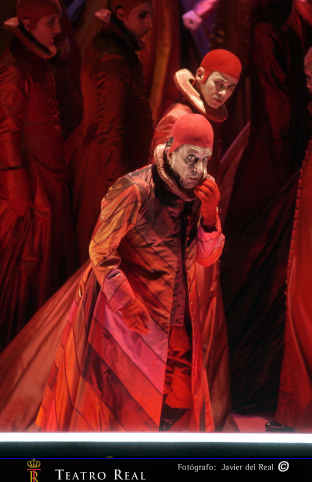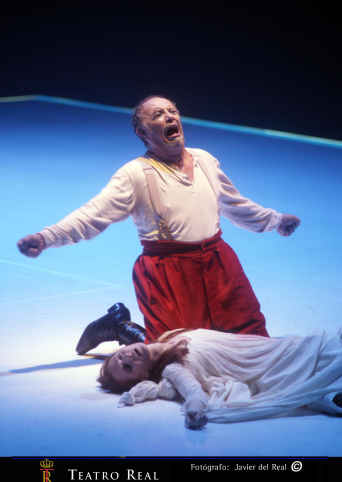Other Links
Editorial Board
-
Editor - Bill Kenny
-
Deputy Editor - Bob Briggs
Founder - Len Mullenger
Google Site Search
SEEN AND HEARD
INTERNATIONAL OPERA REVIEW
Verdi, Rigoletto: Soloists,Orquesta Sinfónica de Madrid. Coro Intermezzo. Conductor: Roberto Abbado.Teatro Real de Madrid. 22. 6.2009 (JMI)
Production from De Nederlandse Opera Amsterdam in coproduction with Teatro Real and Barcelona’s Liceu.
Director: Monique Wagemakers.
Sets: Michael Levine.
Costumes: Sandy Powell.
Lighting: Reinier Tweebeeke.
Cast:
Rigoletto: Leo Nucci.
Gilda: Patrizia Ciofi.
Duca di Mantova: Celso Albelo.
Sparafucile: Marco Spotti.
Magdalena: Nino Surguladze.
Monterone: Luiz Ottavio Faria.

This performance of Rigoletto was the only one programmed to feature Leo Nucci as the jester in Madrid and there were enormous expectations about it. These were completely justified as the final result was perhaps the most spectacular performance of any seen until now at the Teatro Real since its re-opening in 1998.
I was far from convinced initially that Leo Nucci would actually appear at the Teatro Real. After the performances of this Rigoletto that I reviewed earlier this month (review) the fact that Mr Nucci would be coming for one night only and the lacklustre musical direction shown by Roberto Abbado meant that my optimism was not terribly high. But Leo Nucci did arrive and the Teatro Real’s Artistic Director Antonio Moral must have pulled out all the stops to have him finally make his debut in this theatre, at least in an opera performance. The effort paid off handsomely.
Leo Nucci is at 68 a miracle of mother nature, only comparable today to his colleague Plácido Domingo aka Superman. It is actually a genuine authentic miracle that he has such vocal freshness at this age and I dare to say that the parallelism goes even further. Both singers, a long time back now, decided to tackle a dramatic repertoire, which was much criticized by the opera experts at the time. Superman was not a dramatic tenor, nor was Nucci a true Verdi baritone. As it happens we could even discuss the same issue today, 30 years after each made their debuts in Otello and Rigoletto. The peculiar thing in both cases is that each of them, both with voices lighter than what the experts demanded , went on to become the protagonists of reference in both operas. And even if Domingo no longer sings Otello, Nucci continues be the Rigoletto; if I were to say that anyone else singing the role was ‘a Nucci’ then veryone would know what I meant. Both of these great singers maintain an incredible vocal freshness: thirty years ago bets on that could easily have been 1000 to 1 against.

All I can say of Leo Nucci’s performance is that it was no interpretation of Rigoletto. He did not play the jester; he simply was Rigoletto from the moment he entered the stage until the finale and the endless bows. After having enjoyed his Rigoletto on several previous occasions, I tried to focus my attention on how he lived the character. It was a real spectacle to see his gestures while Gilda sang “Tutte le feste al tempio”. They were minimal, natural gestures, of a deeply wounded father in love with his daughter. This capacity to be Rigoletto could not help but be transmitted to the audience who lived the tragedy of “Il Buffone” with a contained emotion that broke into a tempest of cheers after each aria. The difference between Nucci’s Rigoletto and any other of three previous interpreters in this production is simply too big to be described. It is not just about singing; it has to do with life itself. I repeat: Nucci was Rigoletto while the others merely interpreted the role. Add to this huge generosity from his part (for the first time we heard an opera bis at the Teatro Real) and his miraculous vocal shape and we are forced to consider as something completely natural, the fact that the audience rewarded him with the loudest reception ever heard in Madrid. It seemed as if no-one was willing to go home.
We are now completely sure about what Madrid audiences want from opera. A couple of weeks ago we sas the first part of this plebiscite in a concert by Juan Diego Florez (review) and this Rigoletto was its second and final part. Public enthusiasm had never before reached similar levels any anyone unable to draw conclusions from these events, would not deserve to govern the destiny of a first rank opera house. Antonio Moral however, has had much to do with these explosions of enthusiasm and it was common knowledge that his
successor Gerard Mortier was in Madrid but did not attend this important event. Too bad for him.
The effects of having Leo Nucci on stage seemed to galavanise everyone involved with the production. Roberto Abbado was much more alive than previously and Patrizia Ciofi was very much better than on the first day. This time she phrased in a remarkable way and was a very convincing Gilda, even though again she did dodge the high E in ‘La Vendetta.’ But no public was not there for such a detail. There was too much emotion on the air.
Celso Albelo was imporved between the first part and the second. He was not too convincing in the aria “Parmi veder le lagrime”. In the following cabaletta he went up to a high D, but it was a little short of beauty and volume. He did repeat the difficult diminuendo in the last verse of ‘La Donna è Mobile’ and I still believe that Il Duca is right up to the limit of capabilities and even a little way beyond them. Having said this, I also think that he has a very promising light tenor and sincerely hope that he handles his career with care.
The Teatro Real was full of opera lovers arriving from all over Spain. After endless curtain calls, there were many gatherings outside of the theatre discussing the truly special event that had occurred in Madrid.
José M Irurzun
Pictures © Javier del Real
Back to Top
Cumulative Index Page
